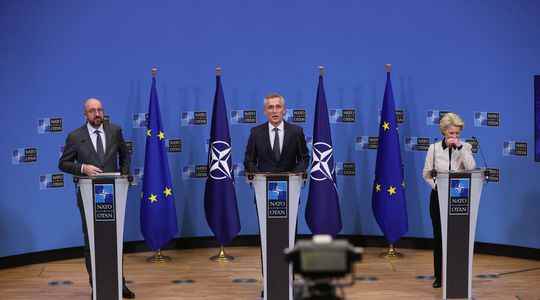Brussels has rarely experienced such turmoil. From Thursday morning, a few hours after the start of the Russian bombardments in Ukraine, declarations and meetings followed one another both in the district of the institutions of the European Union in the city center and at the new NATO headquarters, off-center in the municipality of Evere.
“We are going to present a package of massive and targeted sanctions, which will target strategic sectors of the Russian economy by blocking their access to key technologies and markets”, announced at 8.30 a.m. the President of the European Commission, Ursula Von der Leyen. . Present at his side, the head of European diplomacy evokes “among the darkest hours for Europe since the Second World War”. “A nuclear power has attacked a neighboring country and is threatening those who come to the rescue with reprisals,” denounces Josep Borrell.
Sanctions against Russia with serious consequences in Europe
At the same time, in the Council building on the other side of the avenue, the permanent representatives of the 27 countries of the European Union are meeting for an initial political discussion. “The priority is to have a maximum of sanctions that come out as quickly as possible”, deciphers a high-ranking diplomat. A ban on exports to Russia, measures hitting economic and financial sectors and individual sanctions against oligarchs close to the Kremlin are on the table. “There will be an energy component,” says a source. what about the exclusion of Swift’s Russia, the system for processing international banking transactions, which is essential for public and private players? This point had not yet been settled at the end of the afternoon.
European capitals are assessing the potential damage. “According to the figures I have seen, Germany and the Netherlands are the two countries that will suffer the most,” said a diplomat from a European country. Some sources report different sensitivities on the severity of the measures to be taken to impress the Kremlin, others minimize the differences by describing on the contrary an unprecedented unity.
Hungary, the usual spoilsport, is muting its dissonances. Viktor Orban’s spokesperson multiplies tweets to ensure that Budapest will be united. In a video subtitled in English, the Hungarian Prime Minister nevertheless clarifies that there is no question of meddling in the conflict and sending military equipment to Ukraine, adding that he does not want to endanger the country’s energy supply. “For some Europeans, there is a form of amazement as to the strength, brutality and speed of the deterioration of the situation”, confides a Brussels source.
NATO activates its defense plans in the east
At 8 p.m., the leaders of the 27 meet in Brussels “with the phones turned off” according to one participant. They have tough decisions to make. “Difficult to predict the dynamics, there is a difference between the theoretical conversations we had and the practice. The emotional impact of what is happening on the ground should not be underestimated”, warns an interlocutor close to the discussions. The Heads of State and Government will make the major arbitrations, their foreign ministers will meet on Friday at 3 p.m. for a formal adoption of the sanctions package.
It is also Friday afternoon that the virtual summit will be held with the leaders of the NATO countries. After a first meeting on Thursday morning, the Atlantic Alliance activated its defense plans on its eastern flank, from the Baltic Sea to Turkey. The Allies have already decided to deploy additional air, sea and land assets in the region. “We have more than 100 combat aircraft on alert and 120 ships at sea, from the far north to the Mediterranean,” said NATO Secretary General Jens Stoltenberg.
In NATO as in the EU, the objective is now unique: to find a way to arrest Vladimir Putin as quickly as possible, some of whom in Brussels are now openly wondering “if he is crazy or if he is pretending of being”.
